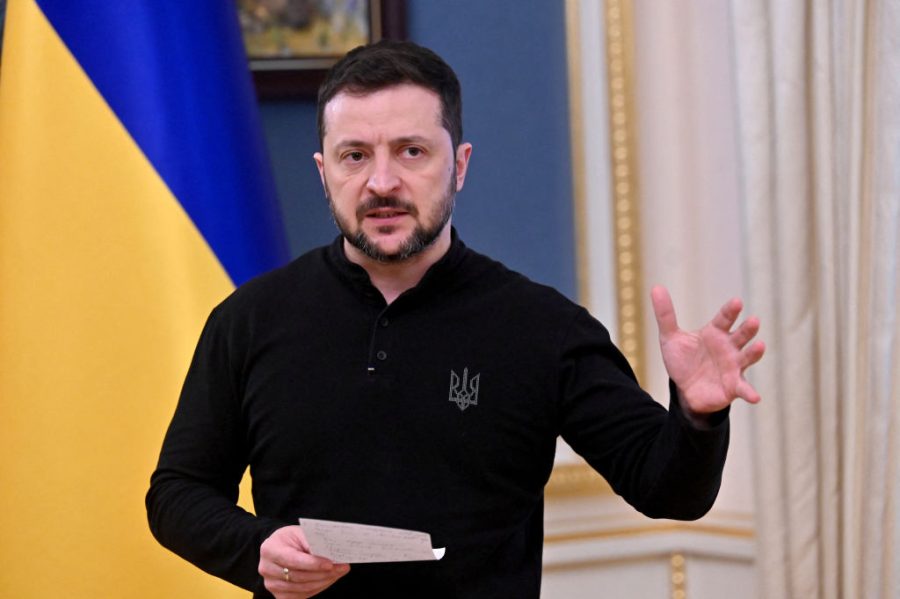So who won from yesterday’s phone conversation between Donald Trump and Vladimir Putin? Arguably, no one did – but nor did anyone really lose. Efforts to end the fighting live, maybe to die, another day.
Putin managed to find a third way between agreeing to an unconditional ceasefire – which the Russians believe would benefit Ukraine, and which would have infuriated the ultra-nationalists – and rejecting Trump’s proposals altogether. The moratorium he called on strikes against Ukraine’s energy infrastructure looks like a concession but actually has little real impact now that winter is past, and the drones and missiles which would have been hitting power stations are still targeting cities.
No one has lost much, and no one has won anything either
He gave the can another kick down the road by agreeing to more detailed talks between officials in Jeddah, which could mean much or little. He may just be playing for time, but he also may be willing to see what, out of the public gaze, can be negotiated. In reality, it is probably both: Putin prefers to keep as many options open as possible.
In the meantime, he started to lay down the kind of conditions, or at least negotiating positions, that he wants to see in wider peace talks. He suggested in an earlier meeting with business leaders that, only if Ukraine accepts Moscow’s annexation of four of its regions – including much land that Russia does not even hold – would he hold back from ‘laying claim to Odessa or other territories currently belonging to Ukraine,’ but this is essentially bluster. There is no likelihood that Russia could take Odessa militarily, so this is really the kind of empty demand that Putin can withdraw as a fake ‘concession’. More seriously, he doubled down on demands that any ceasefire must be accompanied by a freeze on Western – not just US – arms deliveries, something that is absolutely to Russia’s advantage.
Meanwhile, Trump certainly appears happy with the way the two-hour conversation went, calling it a ‘great call’, and admitting that getting a full ceasefire ‘without going a little bit further, would have been tough’. He has enjoyed another moment in the limelight, punted the tough discussions to negotiator Steve Witkoff, and even raised the prospect of US-Russian ice hockey games for a bit of spectacle.
Trump’s attempts to broker peace may not have succeeded, but they have not failed yet, either. He also seems to have got a glimpse of a possible lateral deal, as the two men reportedly agreed that Iran should never be in a position to destroy Israel. The hint may well be that the Kremlin would be willing to throw some of its allies – Iran, North Korea, certain African kleptocracies – under the bus, if Washington is willing to do the same to Ukraine.
Kyiv can breathe a sigh of relief. The nightmare scenarios of some ugly backdoor deal whereby Trump tries to sign away its territory and sovereignty – starting with the rumoured recognition of Russia’s annexation of Crimea – did not manifest. The moratorium on attacking the energy infrastructure, and a proposed ceasefire in the Black Sea, probably benefit Russia more than Ukraine. But for the moment, US military aid and intelligence sharing continues, and Zelensky has more time to repair relations with the White House and influence the potential outcomes of the negotiations.
As for Europe, it is still essentially out of the room, not least as belligerent rhetoric from the European Commission’s Ursula von de Leyen and Kaja Kallas has managed the impressive feat of alienating Washington and Moscow simultaneously. Former Russian president Dmitry Medvedev, whose increasingly hawkish social media posts have achieved an almost poetic level of toxic surrealism, claimed that:
The phone call between Presidents Putin and Trump proved a well-known idea – there is only Russia and America in the dining room. On the menu: light appetisers – Brussels sprouts, British fish and chips and Paris rooster. The main course is a Kiev-style cutlet. Enjoy your meal!
Again though, the slowing of the political tempo actually gives Europe some room to gain more traction in the process. British diplomats are doing what they do best, working quietly behind the scenes, and appear to have some hope that they are going to be able to recapture some of the discussion yet.
No one has lost much, and no one has won anything, either – with the exception of the additional 23 wounded Ukrainian prisoners Putin added to a pre-arranged swap as the kind of token gesture he calculates will flatter Trump. The Kremlin declared its readiness to find a ‘comprehensive, sustainable and long-term’ solution (that also ‘ensures Russia’s legitimate interests’), while the White House noted that ‘both leaders agreed this conflict needs to end with a lasting peace’ and talked of the ‘huge upside’ to improve US-Russian relations. All very bland. Yet at least, even if the war-war continues, so too does the jaw-jaw.








Comments